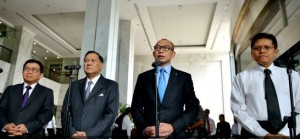As Global Economy Fluctuates, BI, OJK, and LPS Carry out Coordination

As Global Economy Fluctuates, BI, OJK, and LPS Carry out Coordination
The Financial Sector Stability Coordination Forum (FKSSK), which consists of the Ministry of Finance, BI (Indonesias Central Bank), the Financial Services Authority (OJK), and the Deposit Insurance Corporation (LPS) established joint coordination on Monday (6/10) to synergize the steps to guard against the potential risks which can come up in the future.
We discussed the developments of the stability of the present financial system and monitored closely the ongoing developments in banking sectors, capital markets, monetary markets, and fiscal matters. In general, the situation is well kept and still under control as expected, Minister of Finance M. Chatib Basri said in the press conference in the Ministry of Finance office in Jakarta on Monday (6/10).
In the press conference, Minister Chatib Basri was accompanied by Bank Indonesia Governor Agus Martowardojo, Head of OJK Board of Commissioners Muliaman Hadad, and Head of LPS Board of Commissioners Heru Budiargo.
The Minister of Finance explained that so far, the stability of Indonesias macro-economy in the third quarter of 2014 is still well maintained amid the processes of global economic recovery. However, the Financial Sector Stability Coordination Forum (FKSSK) also sees the potential risks which demand special attention and must be anticipated well, as follows.
First, the increase in the Fed Funds Rate occurs earlier, is higher than estimated, affects directly financial sectors, and causes pressures on capital markets, the government bond (SUN) markets, and exchange rates. Second, the Minister of Finance continued, the slowdown in Chinas economy and the decrease in commodity prices affect the current account deficit. Third, the effects of the weakening exchange rates and the developments in fiscal management must be anticipated by keeping the budget deficit at the level of 2.4 percent.
Guarding against such risks, according to Minister Chatib Basri, FKSSK agreed to keep monitoring and responding to them by issuing the right policies.
In addition, FKSSK is also strengthening coordination to mitigate the sources of vulnerability which can potentially undermine the stability of the financial system by, for example, strengthening policy coordination in controlling inflation and current account deficit, in order to make the processes of economic adjustment go well and smoothly.
FKSSK, the Minister of Finance continued, will also build coordination in market penetration and expansion, both in monetary markets and in capital markets.
Lastly, FKSSK will also increase the readiness of the anticipatory steps if sudden reversal occurs.
From the fiscal point of view, Minister of Finance M. Chatib Basri stated that the Government has prepared the policies by decreasing the net domestic treasury notes (SBN) in the 2015 state revenues and expenditures budget (APBN) by IDR 27.9 trillion.
The aim is to minimize our (Indonesias) dependency on debts, especially foreign debts. In the future, if the budget deficit is smaller, our dependency on foreign loans will also become smaller, Minister Chatib Basri explained and mentioned that the Government is making efforts to maintain stability in the monetary markets by minimizing the dependency on foreign loans.
In agreement with the Minister of Finance, Bank Indonesia Governor Agus Martowardojo said that although rupiah exchange rate in the last two weeks depreciates and reached IDR 12,212 per US dollar in 6 October 2014 trade, its exchange rate still remains at 1.57 percent in the month-to-month basis and 0.12 percent in the year-on-year basis due to both internal and external factors. Nevertheless, in general, the stability of our financial system is still well maintained, he stated. (Humas Kemenkeu/ES)








